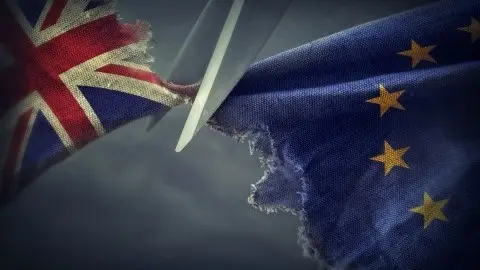One year on from Article 50, GBP remains the comeback kid of FX markets
The trade-weighted pound is up more than 5.5% and while the path to recovery has been gentle and bumpy, sterling's move higher is evidence of its undervaluation and an inverse relationship with Brexit uncertainty. Going forward, we expect GBP to continue on a path of recovery - with a 3-5% appreciation in the trade-weighted index
Shifting to a higher gear as Brexit transition verifies ‘Comeback Kid’ status
All the cards are falling into place for GBP/USD to post a bullish move to 1.45 in 2Q18 – which is where our conviction continues to lie. Looking at GBP's report card in March including Brexit politics, UK economic data and the Bank of England's (BoE) policy outlook have all turned into short-term positives for GBP – helping it to retain its status as the ‘comeback kid’ in FX markets.
We're now back to good old-fashioned data watching in the near-term – given that this will dictate the pace of GBP's cyclical recovery. Under the status quo on the global economic backdrop and trade wars are a big question mark here, it looks like a rate hike in May is a done deal.
Were the UK economy to regain some of its ‘cyclical swagger’ – and data outperforms the broadly low expectations of investors, we would expect sentiment for two BoE rate hikes in 2018 to gain further traction. This will be the cue for GBP to post another bullish move higher.
May rate hikes seems to be in the bag and GBP bulls are asking what next?
The question for GBP investors now turns to the pace of BoE tightening – which we suspect both economic data and Brexit progress will continue to dictate.
However, the two are not mutually exclusive. But for those thinking market expectations over BoE policy are too 'rosy', comments by policymaker Gertjan Vlieghe that we may see one or two rate hikes a year are the first real indication by a BoE official on the annual pace of policy normalisation and gives implicit support to a steeper UK rate curve and GBP remaining at current elevated levels.
Theoretically, there is now scope for the UK economy to surprise to the upside following the agreement of a Brexit transition. Lower economic uncertainty coupled with political stability may facilitate an environment where UK investment comes back online – and if sizable enough could see the UK shake off its status as one of the worst-performing G10 economies. Markets are underestimating this channel.
Short GBP on Brexit and UK politics has clearly been one of the biggest ‘pain trades'
Whether it’s Brexit fatigue, the Divorce and Transition Deal precedence of a last-minute agreement or ‘FOMO’ - the fear of missing out on a positive re-pricing of Brexit risks, the pound’s relative resilience – noting the stability in EUR/GBP within the narrow 0.87-0.89 range – is quite telling of how investors may be less inclined to chase a negative Brexit headline. A continuation of solid UK economic data would offset any Brexit-specific risks. Such a trading environment was non-existent in 2017, where markets were largely taking their cue solely from Brexit progress.
The shift in positive GBP sentiment is still in its infancy – as real money investors have not broadly become ‘bullish believers’ just yet. GBP/USD speculative positioning is at a multi-year high (+12%) – though we note that there remains a large discrepancy between leveraged funds and asset managers. The latter group of investors remain structurally short GBP/USD (20% of open interest).
Every small-step of Brexit progress will see these structural shorts slowly unwind - and gives us greater confidence that GBP's cyclical recovery has room to extend.
This publication has been prepared by ING solely for information purposes irrespective of a particular user's means, financial situation or investment objectives. The information does not constitute investment recommendation, and nor is it investment, legal or tax advice or an offer or solicitation to purchase or sell any financial instrument. Read more
Download
Download opinion
29 March 2018
In Case You Missed it: One year to go This bundle contains 7 Articles
Viraj Patel
Viraj is an FX strategist at ING. He has been with the firm since January 2015 and covers developed markets. Prior to this, he worked at Barclays and the Bank of England. Viraj read Economics at the University of Cambridge and is currently working towards his CFA charter.
Viraj Patel is no longer part of the ING THINK team
